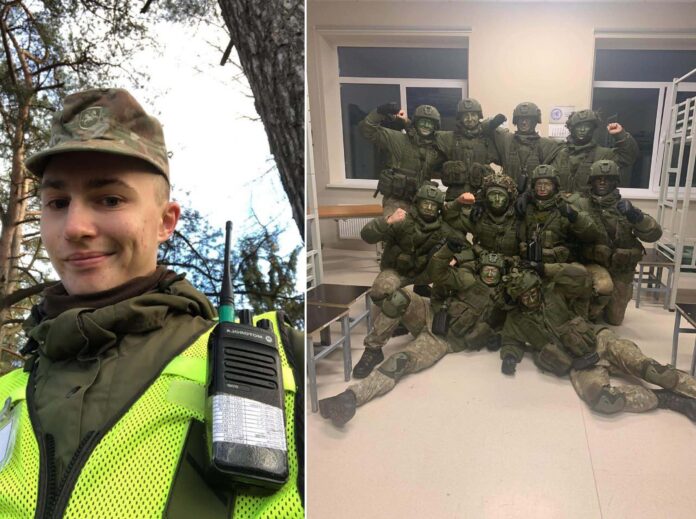
A Recruit from Canada Tells his Story
Every year in the month of January, the Lithuanian Ministry of Defence publishes a list of young Lithuanian citizens living in both Lithuania and abroad, who must register for service in the armed forces. This year the list appeared on the tevzib.com Facebook page, and received some very clear responses reflecting a tendency among young Lithuanians to forego citizenship rather than serve in its army.
Joris Meiklejohn, who is a citizen of both Canada and Lithuania, was interviewed by Sigina Katkauskaitė to find out what nine months of service in the Lithuanian army is really like.
Born and raised in Toronto in a Lithuanian-Scottish family, Joris is a mechanical engineering student at the University of Toronto, active in the Lithuanian community especially through folk-dancing and basketball. He has spent the last four months in military uniform in Lithuania, at the Rukla army base near Jonava.
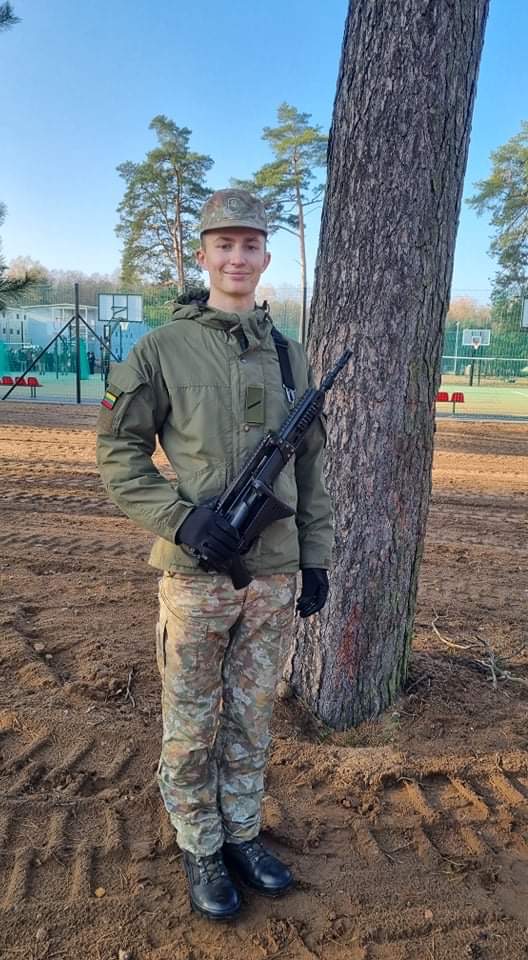 In the interview, Joris revealed that he had never considered a military career or service, and had no interest in weapons. However, once the pandemic started and university lectures went online, restricted social life led to boredom and it occurred to him that this might be the time to complete his military service, before beginning a career and family. It had also been seven years since he had visited his mother’s country of birth, which his family did fairly often, and he had hoped to spend more time there. His final decision was shaped by the pandemic, by feelings of connection to the country (although he doesn’t consider himself an exemplary “patriot”), and the desire to set himself a challenge.
In the interview, Joris revealed that he had never considered a military career or service, and had no interest in weapons. However, once the pandemic started and university lectures went online, restricted social life led to boredom and it occurred to him that this might be the time to complete his military service, before beginning a career and family. It had also been seven years since he had visited his mother’s country of birth, which his family did fairly often, and he had hoped to spend more time there. His final decision was shaped by the pandemic, by feelings of connection to the country (although he doesn’t consider himself an exemplary “patriot”), and the desire to set himself a challenge.
He was included in the conscription list, but delayed sending his documentation, and had to pay a small fine. University students are allowed to delay service until a more convenient time. He registered as a volunteer in the next round of recruitment. During the school term, he went to Vilnius for a health examination, and was deemed fit for service. His knowledge of the Lithuanian language was challenged during the psychological evaluation, and he missed several questions, but his results were positive. Although one member of the examining committee expressed doubts as to his Lithuanian language ability, he has no problem with it.
Although they serve in the same army, conditions for volunteers are different than for regular recruits. The latter are called up by means of a digital lottery, and must serve wherever they are assigned. At the end of their service, they receive a slightly lower wage. Volunteers who excel during their service might earn up to 3,300 euros, those who score well – 2,800, and a satisfactory rating earns 2,300 euros. The government also compensates at least 75% of expenses incurred fro travel to Vilnius for the health exam. Volunteers may choose where they will serve. He was tempted to choose an engineering unit, and would have served in Kaunas, but decided to join the mechanized infantry, and serves in the Grand Duke Vaidotas regiment.
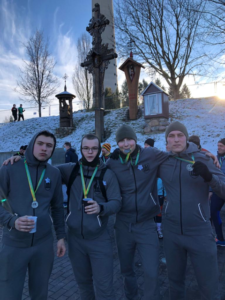 Daily life begins at 5:45 AM, with exercise, breakfast and clean-up, morning inspection, then program activities from 8:30 to 12:30. After lunch activities continue until dinner at 5:30, then in the evening as well. A great deal of time is dedicated to weapon maintenance, because they are quite dirty after exercises in the woods. Evening activities depend on who is on duty, as there are 30 professional soldiers in the regiment who take turns, and they determine the schedules. Some are kind, and some like to show their authority, said Joris.
Daily life begins at 5:45 AM, with exercise, breakfast and clean-up, morning inspection, then program activities from 8:30 to 12:30. After lunch activities continue until dinner at 5:30, then in the evening as well. A great deal of time is dedicated to weapon maintenance, because they are quite dirty after exercises in the woods. Evening activities depend on who is on duty, as there are 30 professional soldiers in the regiment who take turns, and they determine the schedules. Some are kind, and some like to show their authority, said Joris.
On the weekends the schedule is different. At first there were lectures, reviews and some outdoor exercises. In the afternoons there was more free time, but due to the pandemic the recruits were not allowed to leave. Two short breaks of several days were granted the new recruits, although the one at Christmas was shortened due to the situation in Ukraine. New Years was celebrated on base. Soldiers are also allowed leave on weekends when there is no pandemic. On base, Joris feels the need for more physical activities, and would like to play more basketball. Others feel that the military exercises provide enough activity.
The most difficult part of army life for Joris is being separated from his family for so long, and adjusting to the strict discipline. It means being totally dependent on rules and leaders, with no free choice, and being responsible not only for himself, but for others as well. He also misses English, and speaking only Lithuanian is tiring after four months. Talking to his brother by phone is a welcome break. He also misses Canadian (or actually American) food, such as hamburgers. The food there is edible, but not the same as he was used to at home. But the “kugelis” is very good.
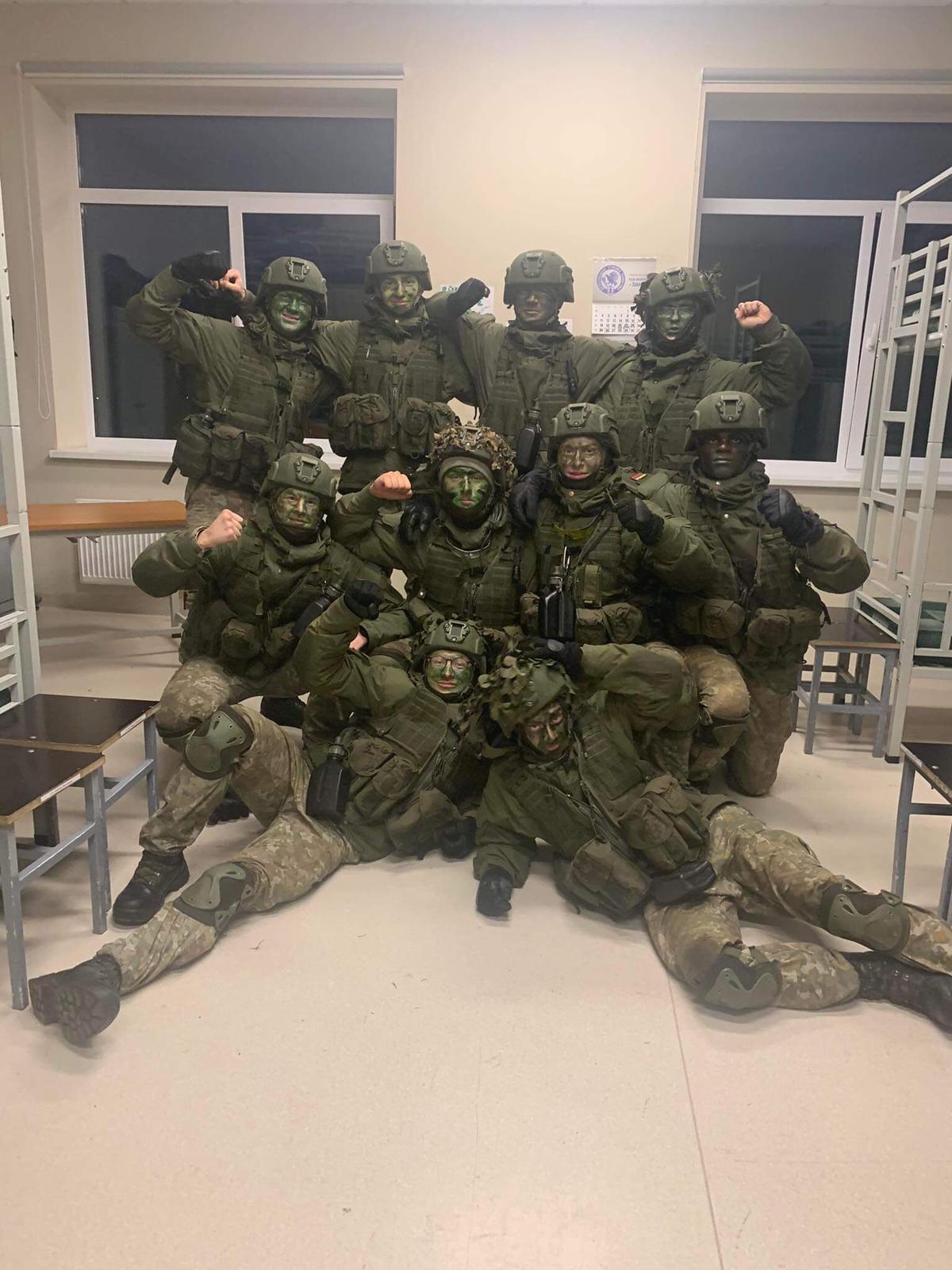
The recruits live in squads of nine to a room. There is a Spaniard in his squad, as well as a few Russian speakers – from Belarus, Ukraine and Russia. He began learning Russian before he went, so he gets to practice with them. It feels like being in Canada, with all its cultural diversity. Everone finds his surname interesting, and there is usually a silence before it is read during inspection, because its pronunciation is so difficult.
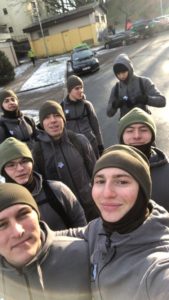 Joris says he is not sorry about choosing to serve, although there are moments when he wonders why he went there, especially during boring or unpleasant assignments or situations. But otherwise, it’s not bad. Basic training took three months, then in the New Year the recruits were divided into groups according to weaponry. He was assigned a machine gun, and when he practices using it in the woods, he realizes why he is there.
Joris says he is not sorry about choosing to serve, although there are moments when he wonders why he went there, especially during boring or unpleasant assignments or situations. But otherwise, it’s not bad. Basic training took three months, then in the New Year the recruits were divided into groups according to weaponry. He was assigned a machine gun, and when he practices using it in the woods, he realizes why he is there.
Many Canadians may not understand the choice he made, because it is unusual, he says, but he is grateful to his parents for supporting his decision and helping him prepare for it. The experience of these months of service is unique, but you have to know why you’re doing it, says Joris. If you were forced to do it, it would be far more difficult. It all depends on how you think about it. He tries to think positively even in the hardest moments. His service ends on July 4, and he will return to his studies in Toronto in the fall.
Adapted from an interview in Lithuanian by Sigina Katkauskaitė






























